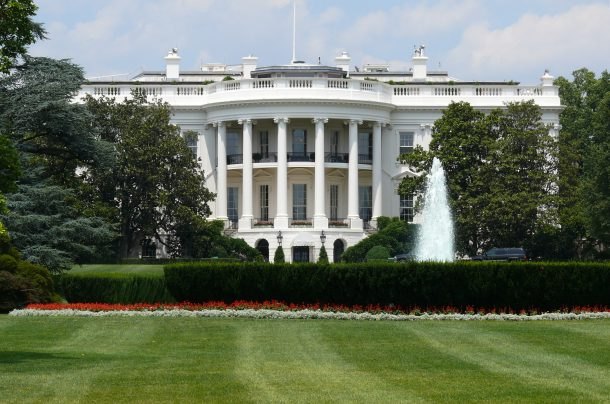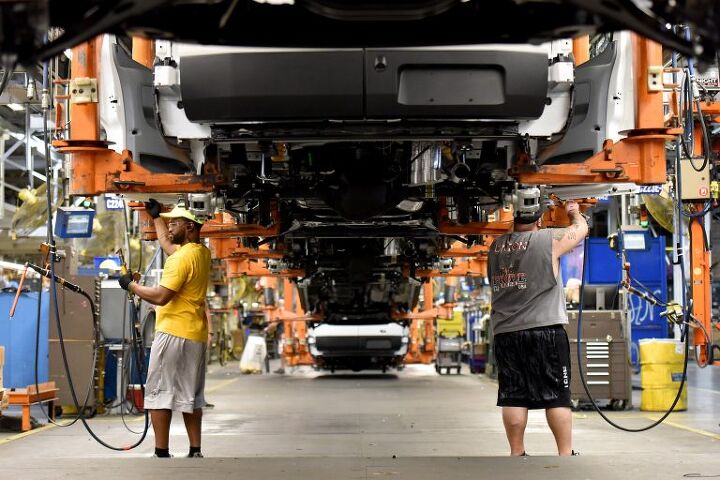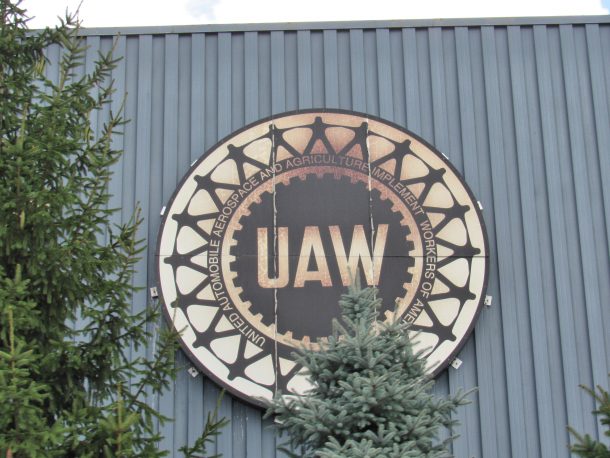#Uaw
A Dozen More States Virtue Signaling Over Vehicle Bans
Having noticed that Washington got a bit of publicity for vowing to ban all vehicles reliant on internal combustion after 2030, a dozen other American states decided it would be a good idea to reaffirm their own religious-like commitment to the environment by saying they too will be restricting your choice of automobiles by 2035.
The coalition of states — most of which don’t have a populace that’s dependent on automotive manufacturing for work — also formally asked the Biden administration to introduce standards that would obligate the United States to ban everything that emits smoke within the next fifteen years. Many activist groups are calling it a heroic act, though it’s difficult to recall any parables where the hero went around banning things and also represented an institutional power structure.
Ford Skipping Summer Shutdowns
Ford will be ignoring the typical two-week summer shutdown this year as a way to make up for production downtime caused by the semiconductor shortage. That’s undoubtedly going to complicate some vacation plans. But Blue Oval has already given loads of workers time off and has more downtime planned through April and now that the necessary factory maintenance can be accomplished while assembly lines are idled during supply chain issues, leaving employees to schedule any time off through their local union.
Automotive Industry Begs U.S. Government for Money
With President Biden planning to announce an infrastructure proposal that could easily exceed $2 trillion, the automotive industry has come to the realization that some of that money could be used to make its job easier. Following Tesla’s attempt at charming the federal government into making carbon credits more valuable, automotive lobbies, supplier groups, and the United Auto Workers (UAW) union have issued a joint letter asking for financial assistance.
Addressed to the president and congress, the document makes numerous requests for help with electric vehicle adoption rates. Industry groups would like to see Biden sign onto significant government tax incentives and subsidies for both buying and manufacturing electric vehicles. But this isn’t limited to passenger cars, they also want tax dollars used to help offset the prices corporations pay on commercial EVs intended for fleet use. Government grants would likewise be set aside for organizations that retool facilities for electric cars, while federal entities make a vow to buy up new fleets that aren’t reliant on liquid fuel.
Semiconductor Shortage Delays More Automobiles
The industry is having to stall more plants to contend with the semiconductor shortage that’s currently making it more difficult for you to get everything from a smartphone on up to your next vehicle. Ford Motor Co. recently informed employees that its Dearborn truck plant (easily one of its most profitable facilities) would need to be idled through the weekend to create a buffer for semiconductor chips. Worse yet, it’s not the first time the automaker has had to stall output of the F-150 this year. Ford has also started manufacturing trucks without all the necessary components, stating it would hold vehicles for a few weeks to account for supply chain delays.
Meanwhile, Chrysler has made a similar announcement about its minivan output as Windsor Assembly faces another chip deficit. Unifor Local 444 recently stated that the facility would be staring down the barrel of a four-week shutdown starting next week. Considering Chrysler’s minivans literally just dealt with a three-week stall over the chip shortage, union workers are understandably upset. Days earlier, General Motors Canada also announced that its CAMI plant in Ingersoll, Ontario, will likely remain idle until the middle of April.
Stellantis Introducing 84 Hour Work Week in Sterling Heights
Stellantis is reportedly bringing back a controversial policy that would have skilled trade workers doing 12 hour days for 7 days a week as a way to maximize shift coverage. The original arrangement had staff pushing long hours only to be rewarded with a full week off. But it was temporarily nixed after workers complained about the schedule and fretted over how the change might impact benefits. An alternative schedule prioritizing flexibility was created, though the automaker (still owned by FCA at the time) stressed that it needed more tradespeople working on the weekends to help avoid production gaps.
The 84 hour week is now back, with Stellantis testing it out at Sterling Heights Assembly, where the Ram 1500 is manufactured. However, it doesn’t appear to have grown in popularity.
UAW Reaches Corruption Settlement With Justice Department
The U.S. Department of Justice has reached a proposed civil settlement with the United Auto Workers (UAW) in the gigantic corruption case that absorbed two former presidents and a slew of union officers over the last few years. With many involved already serving the first part of their prison sentence, the UAW has reportedly agreed to hold a referendum among the rank-and-file to change the way it elects the top brass. The proposal predictably includes some court oversight designed to catch any new instances of fraud coming from inside the union but doesn’t appear to address the corporate aspect.
As a positive, it’s not assumed that the union will see a complete government takeover. Like laundry, it’s already better to separate your alleged corruption to create legal buffer zones.
Automotive Politics: A Tale of Two Industries?
Politics have corrupted just about everything under the sun over the last few years. Practically everything is political in 2020 and if you have an opinion about that, it had better be the correct one and sanctioned by your preferred party. After all, having an approved take is far more important that an accurate one. But what of the automotive industry? Where do the carmakers fall on the supposedly important spectrum?
Well, we know that the UAW predictably endorsed Joe Biden for president way back in spring. But those heading the companies distributing union members’ paychecks quite literally came to Donald Trump in 2017 to ask that he take it easy on them. Obama-era regulations had made efficiency mandates so strict, that automakers had become convinced they’d be unable to meet them in the years ahead. While Trump’s relationship with the industry often runs hot and cold, he pushed for a fueling rollback that placed federal authorities at odds with California and kicked off a regulatory conflict of epic proportions.
Assuming Biden wins the election, those stringent emissions mandates will undoubtedly come back into play — surrounded on all sides by his climate and environmental justice proposal, which makes a federal investment of $1.7 trillion over the next 10 years. While automotive exclusives are hesitant to share their regulatory fears with the general public, especially as they attempt to put on the greenest face possible for marketing purposes, there are real concerns that the U.S. could embrace policies similar to Europe. That could force a change of course for a few companies and complicate the overall trajectory for the U.S. market.
Another Former UAW President Pleads Guilty to Embezzlement
Dennis Williams, the former president of the United Auto Workers, pleaded guilty to embezzling union funds on Wednesday. His copping to the conspiracy charge comes after his successor, Gary Jones, similarly pleaded guilty to misappropriating more than $1.5 million from the UAW in June. They’re joined by numerous co-conspirators that have been caught in a gigantic federal probe hoping to address union corruption and appears to have hit pay dirt.
Appearing by video in the U.S. District Court in Detroit, Williams entered his plea and apologized about the current state of the UAW. “I want to close by apologizing to this court, to my family and to each and every hard-working member paying dues,” he said. “I hope by accepting responsibility for my actions and for my failures, this process might help restore the faith in our union.”
GM Files State Lawsuits Against FCA Over Racketeering Claims
General Motors refuses to let the dismissal of its federal racketeering case against Fiat Chrysler Automobiles stand in the way of getting what it believes is true justice. On Monday, the automaker filed its latest claim with Wayne County Circuit Court in Michigan. These are separate from the New Jersey lawsuit it has targeting former board member and ex-UAW vice president Joe Ashton, who GM has accused of being a hired mole. However, Ashton was named in the trio of new court filings, along with Alphons Iacobelli — the man who pled guilty to embezzling union funds and kicked off a gigantic federal corruption investigation into the UAW.
The automaker also named some of the banks it claimed were involved in the union scandal and continues to allege that FCA “provided millions of dollars to co-conspirators via numerous undisclosed offshore bank accounts and utilized such accounts to purchase the support and silence of numerous high-level UAW officers and FCA executives.” Fiat Chrysler’s assumed goal? Forcing General Motors into a merger or destroy it if the merger failed by negotiating favorable terms with the union and encouraging leadership into adopting positions that would harm GM.
Ford Chosen by Unifor as Canadian Bargaining Target
Unifor has selected the Ford Motor Company as its target for collective bargaining. Once negotiations conclude, the union will be using the terms established with the automaker to lay the groundwork for pattern deals with General Motors and Fiat Chrysler Automobiles.
While the talks have not yet begun, we already know Unifor wants to cement production commitments in Oakville, Ontario, where Ford is rumored to be ending Edge assembly. It would also like to secure deals for FCA plants in Brampton and Windsor. Naturally, the union will also be demanding wage increases — though this is sometimes the most contentious issue. Contract talks from 2016 became stuck in the mud over higher pay until Ford insisted employees remain subject to a 10-year wage grow-in that union members had been split on. It’s unclear if that will remain the case in 2020 but we genuinely haven’t had high hopes for the Union pulling out anything that resembles a major victory.
Ex-UAW Prez Dennis Williams Snared by Corruption Probe, Charged With Embezzlement
The writing was on the wall for months, ever since federal agents raided former United Auto Workers president Dennis Williams’ home last September.
Since hosting those gun-toting visitors, Williams cooled his heels, uncharged by waiting for the inevitable hammer to drop. We say inevitable, as Williams’ name was mentioned as a co-conspirator in the trial of another UAW official, with Williams accused of funneling funds earmarked for UAW members into lavish living and gifts for himself and his fellow embezzlers.
In the meantime, Williams watched the union’s previous president — his successor — step down and subsequently be charged for the same illicit deeds court documents claim he performed.
On Thursday, the inevitable came.
UAW Slams GM for Allowing Office Staff on Assembly Lines
Alleged absenteeism stemming from the coronavirus outbreak encouraged General Motors to place salaried volunteers on assembly lines in Wentzville, MO. This has not gone over well with the UAW, which suggests GM’s decision to utilize non-union staff is in direct violation of its 2019 labor contract. The union claims white-collar workers have no business being on assembly lines and has issued a formal warning to the automaker.
Established in 1983 as a stamping and production facility, the site is currently responsible for General Motors’ full-size vans (e.g. Chevrolet Express) and midsize trucks (Chevy Colorado/GMC Canyon). The facility has room for 4,560 employees — most of whom are hourly. Those employees are split between the the usual three shifts, with GM claiming difficulties in keeping them populated.
In July, the company said it might have to reduce the plant to just two shifts before pressure from outside convinced it otherwise. This led to the automaker seeking about 200 temporary workers and placing ads with local outlets.
Judge Denies GM Bid to Reinstate Racketeering Case Against FCA
General Motors’ attempt to revive its RICO lawsuit has failed after a federal court claimed the new evidence presented was too speculative to start the legal process back up. U.S. District Judge Paul Borman dismissed the case with prejudice in July, calling it a “waste of time,” but GM returned with new evidence it hoped might turn the tables.
Filed in November, the General’s case against FCA claims its rival finagled a labor advantage by bribing UAW officials during key contract negotiations. With a federal corruption case still probing the union, and with Fiat Chrysler’s known involvement, it seems like GM might have had a case here. But Judge Borman didn’t think there was sufficient evidence before, and hasn’t changed his mind since.
Fiat Chrysler to Judge: GM's Being Paranoid, Please Ignore
General Motors desperately wants to reopen a case dismissed last month by a federal judge, but Fiat Chrysler’s having none of it.
The racketeering lawsuit filed by GM against its crosstown rival alleged that FCA secured unfair labor advantages over GM via bribed UAW officials, with the automaker claiming last week that it possesses new evidence capable of convicting its automotive foe. A number of offshore bank accounts fueled the bribery effort, GM claims, with the automaker’s court filing accusing former UAW Vice President (and ex-GM board member) Joe Ashton of being a paid mole.
Gripping stuff, but FCA says it’s seen this movie before — and it’s a stinker.
GM Asks Court to Reinstate RICO Suit Against FCA, Claims New Evidence
Last November, General Motors filed a racketeering suit against Fiat Chrysler Automobiles, claiming its rival was involved in a prolonged bribery scheme with UAW leaders to gain an unfair labor-cost advantage. Despite FCA already having staff participating in a vast union corruption scandal, U.S. District Judge Paul Borman dismissed the GM case in July after claiming there was nothing to it beyond petty corporate squabbling.
Now GM is back, claiming it has new evidence against FCA that’s going to blow the lid off everything.
On Monday, the General asked the court to reinstate the racketeering lawsuit. It now claims that there’s evidence of foreign bank accounts used in the alleged bribery scandal. We say “alleged” despite the FBI’s continued investigation into the UAW (separate from the GM-FCA suit) showing criminal levels of corruption. The company even suggested that Alphons Iacobelli ( who is already serving time for bribing union officials) channeled sensitive information back to FCA after being hired by GM. The claimed plot then has Fiat Chrysler paying the Iacobelli family millions of dollars via overseas accounts.
“These new facts warrant amending the court’s prior judgment, so we are respectfully asking the court to reinstate the case,” GM said.

























Recent Comments